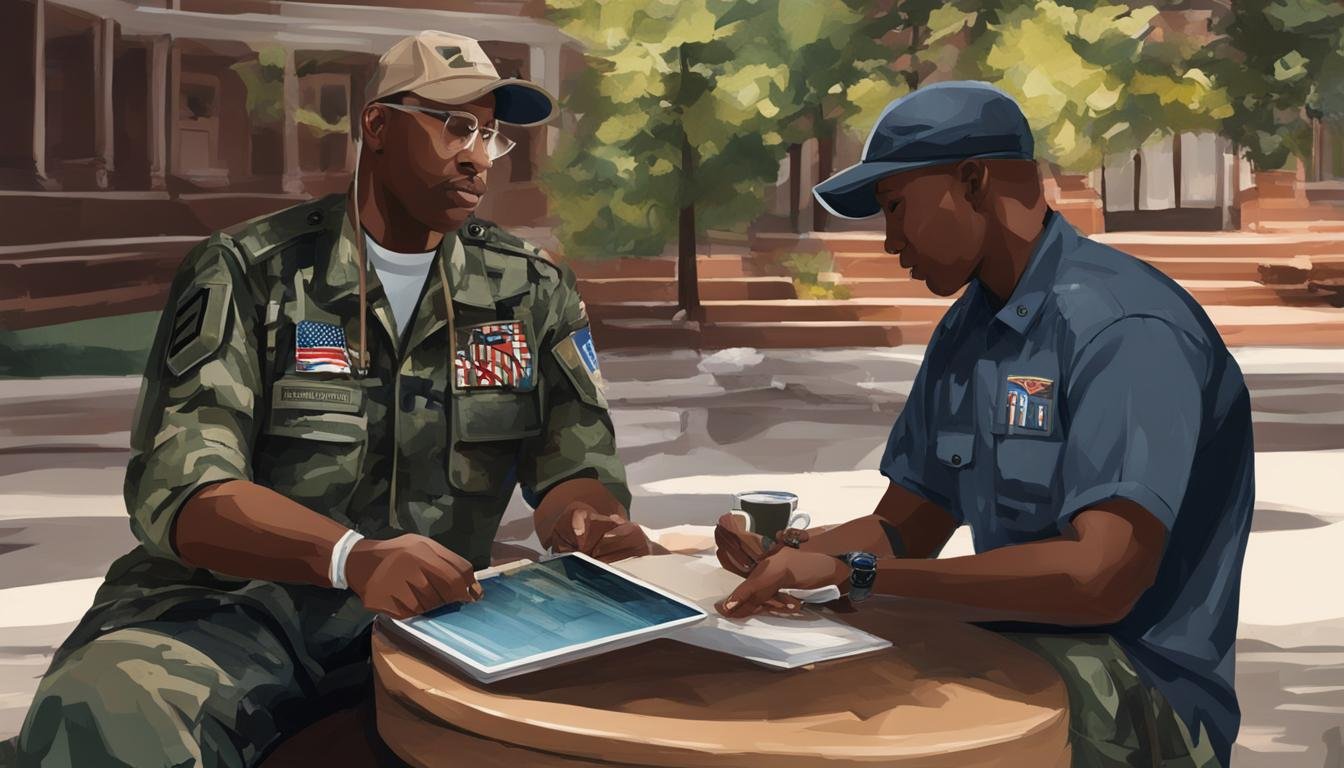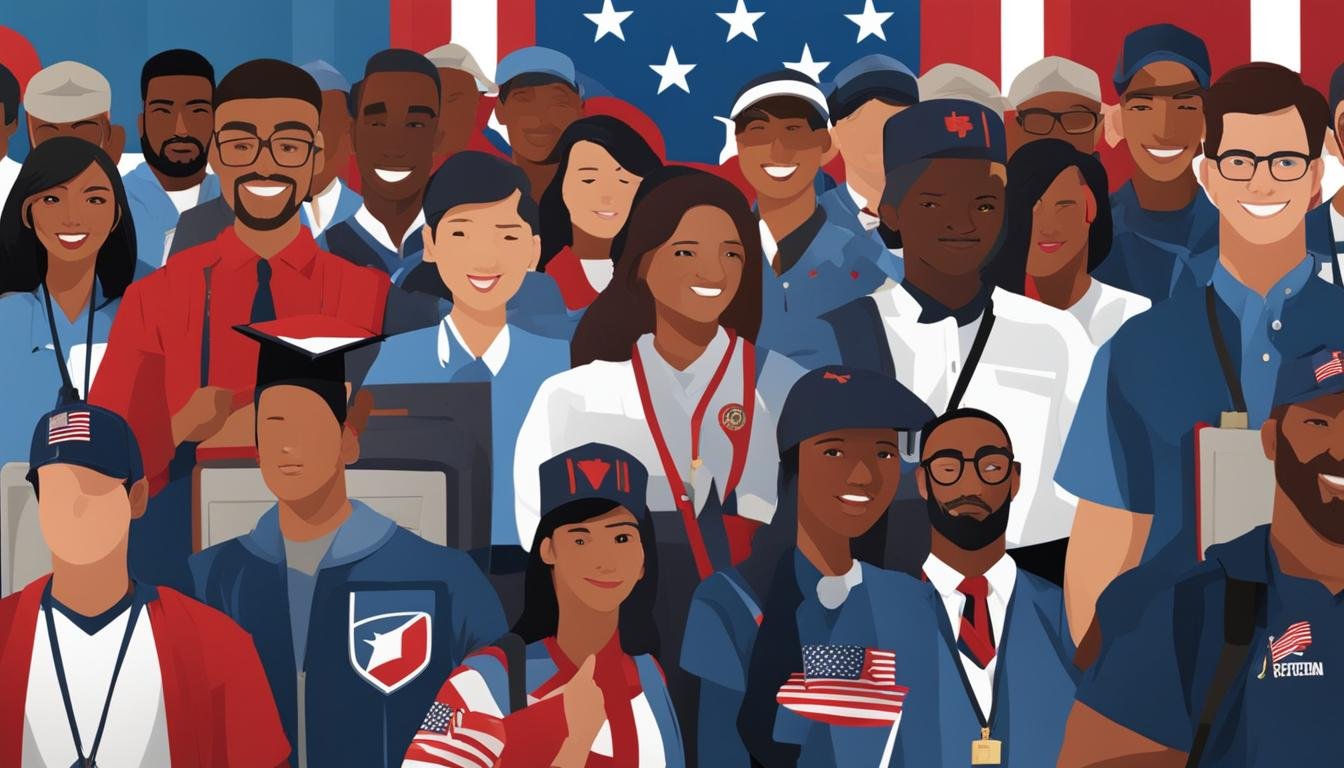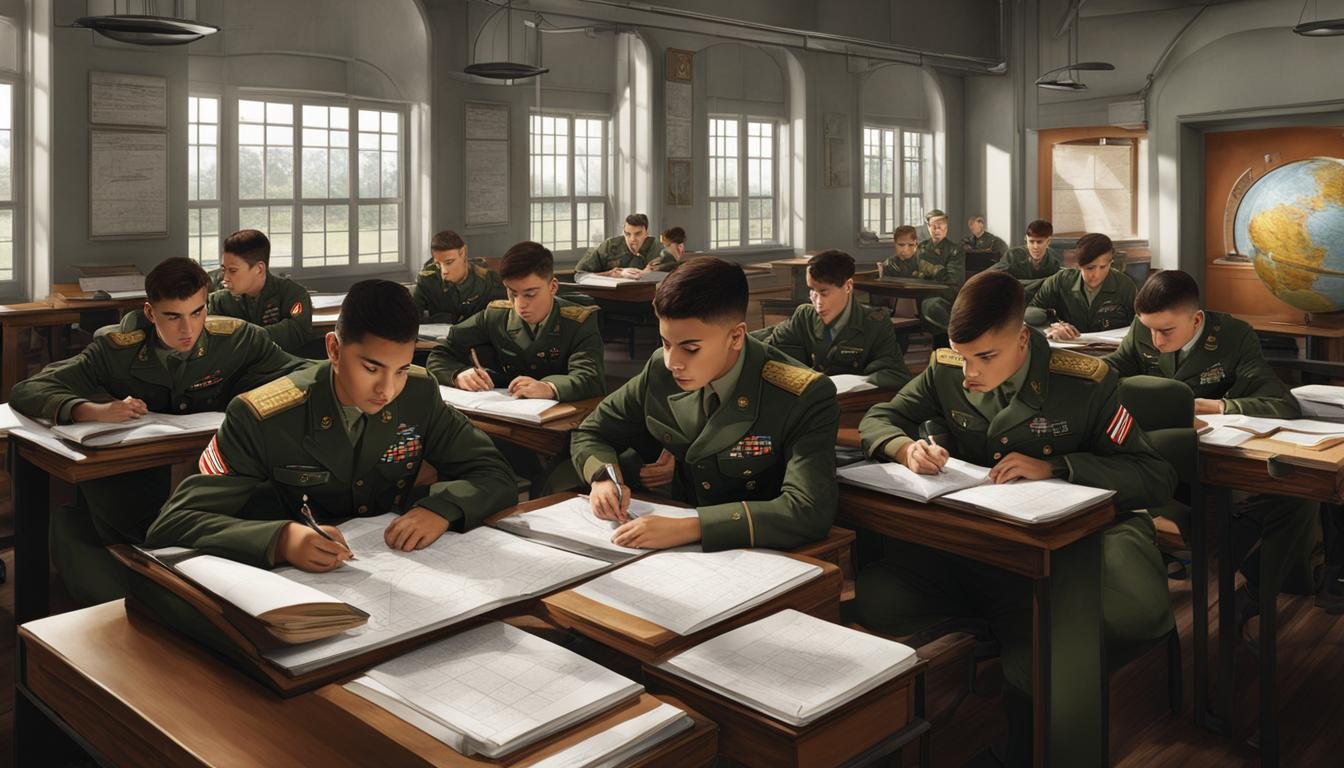When it comes to selecting a college, there are many factors to consider. For student veterans, one crucial aspect that should not be overlooked is the campus culture. Campus culture plays a pivotal role in creating an environment that is supportive and accommodating to the unique needs of veteran students.
With approximately 1 million veterans enrolled in U.S. higher education institutions, it is crucial to understand the attributes of a veteran-friendly college. Student veterans are nontraditional students who face distinct barriers to completing their degrees. Many of them manage mental health conditions such as PTSD, depression, and suicidal ideation. Therefore, it becomes essential for campuses to foster a holistically inclusive environment that supports these students.
Key Takeaways:
- Campus culture plays a significant role in selecting a veteran-friendly college.
- Student veterans face unique barriers to completing their degrees, including managing mental health conditions.
- A holistically inclusive environment is crucial to support the needs of student veterans.
- Student veterans tend to be older, married with dependents, and have professional experience.
- Attributes of a veteran-friendly college include understanding and addressing the unique challenges faced by student veterans.
The Student Veteran Experience With Mental Health

Student veterans often face significant challenges with their mental health while navigating their college experience. Studies have shown that up to 40% of student veterans exhibit signs of Post-Traumatic Stress Disorder (PTSD), a mental health condition that can impact their academic performance and overall well-being. Many student veterans also report symptoms of severe anxiety, which can further hinder their ability to succeed in their studies.
A concerning number of student veterans also experience depression, with around a quarter of them screening positive for depressive symptoms. This can lead to difficulties in meeting academic deadlines and an increased risk of academic failure. In fact, student veterans dealing with depression are more likely to submit assignments late, skip classes, and perform poorly on exams.
Perhaps one of the most alarming findings is related to the prevalence of suicidal thoughts among student veterans. A survey conducted among 628 student veterans revealed that a staggering 46% reported thinking about suicide, while 20% had already devised a plan. These figures highlight the urgent need for comprehensive mental health support tailored specifically to the unique needs of student veterans.
The Importance of Mental Health Support for Veterans
Providing effective mental health support for student veterans is crucial for their overall well-being and academic success. By addressing their mental health challenges head-on, colleges and universities can create an environment that fosters resilience, engagement, and success for student veterans. It is essential for institutions to prioritize the development and implementation of comprehensive mental health programs that offer a range of support services, including counseling, therapy, and access to specialized resources.
Additionally, colleges and universities should enhance awareness and understanding of mental health issues among faculty and staff members. This can be achieved through targeted training programs that equip educators and support staff with the knowledge and skills to recognize and respond to the unique needs of student veterans. By creating a campus culture that values and prioritizes mental health, colleges can create an inclusive and supportive environment that empowers student veterans to thrive academically and personally.
| Mental Health Challenges Faced by Student Veterans | Prevalence |
|---|---|
| PTSD | Up to 40% of student veterans show signs. |
| Depression | Approximately 25% of student veterans screen positive for symptoms. |
| Suicidal Thoughts | 46% of student veterans report thinking about suicide. |
Addressing the mental health needs of student veterans is not only a moral imperative but also an investment in their success. By providing comprehensive support services and fostering a campus culture that promotes mental well-being, institutions can create an environment where student veterans can thrive academically and achieve their educational goals.
Why Is Inclusion Important to Student Veterans?

Student veterans face unique challenges when it comes to successfully completing higher educational degrees. As nontraditional students, they may have difficulties integrating and engaging with younger student populations. This can be due to their age, as many student veterans tend to be older and have already started families. Additionally, student veterans often have limited interactions with faculty, which can make it harder for them to navigate the academic environment and seek support when needed.
One of the key challenges faced by student veterans is the social integration within the campus community. Many student veterans have experienced significant time away from a traditional academic setting due to their military service. This can lead to feelings of isolation and a sense of disconnection from their peers. It is important for colleges and universities to foster a sense of belonging and create opportunities for social interaction among student veterans.
The retention rates of student veterans are also influenced by the level of inclusion they experience on campus. Without a supportive and inclusive environment, student veterans may struggle to persist and complete their degrees. By addressing the challenges faced by student veterans and implementing strategies to promote social integration, colleges can improve retention rates and increase the educational success of this nontraditional student population.
Benefits of Inclusion for Student Veterans
When student veterans feel included and supported on campus, they are more likely to thrive academically and personally. Here are some of the benefits of promoting inclusion for student veterans:
- Enhanced social support: Inclusive environments provide student veterans with a network of peers who understand their experiences and can offer support and camaraderie.
- Improved mental health: Social integration and a sense of belonging have positive effects on mental well-being, reducing the risk of mental health issues among student veterans.
- Increased academic success: When student veterans feel welcomed and supported, they are more likely to actively engage in their coursework and seek out resources for academic success.
- Higher retention rates: Inclusion initiatives can lead to higher retention rates among student veterans, ensuring that they have the necessary support to persist and complete their degrees.
By recognizing the unique challenges faced by student veterans, colleges and universities can take proactive steps to create an inclusive campus culture that supports the academic and personal success of this nontraditional student population.
| Challenges Faced by Student Veterans | Impact on Social Integration | Retention Rates |
|---|---|---|
| Difficulties integrating with younger students | Feeling of isolation and disconnection from peers | Lower retention rates |
| Limited interactions with faculty | Difficulty navigating the academic environment | Higher risk of dropping out |
| Time away from traditional academic setting | Challenges in adapting to student life | Lower persistence rates |
Conclusion
To create a veteran-friendly college, you should prioritize the inclusion of student veterans and establish a supportive campus culture. One essential step is to establish a dedicated student veterans office that offers transitional counseling and assistance. This office can provide valuable resources and guidance to help student veterans navigate their educational journey smoothly.
Supporting student veterans also involves providing resources and training for faculty and staff. By developing military cultural competency, faculty and staff members can better understand and address the unique needs of student veterans. This training can foster a more inclusive and supportive environment for these nontraditional students.
Additionally, it is crucial to train university health specialists to identify and understand mental health conditions specific to student veterans. By equipping these specialists with the knowledge and skills to address the mental health challenges faced by student veterans, colleges can provide the necessary support to ensure their well-being and academic success.
Furthermore, offering alternative modes for extracurricular activities and social interactions can promote the integration and engagement of student veterans with the broader campus community. By organizing events and activities that cater to the diverse interests and schedules of student veterans, colleges can create a vibrant and inclusive campus culture that celebrates their contributions and experiences.
By implementing these veteran-friendly college programs and prioritizing the support of student veterans, campuses can make a significant impact on the educational success of this unique student population. Remember, a welcoming and inclusive campus culture is crucial in attracting and retaining student veterans, ultimately setting them up for success.



